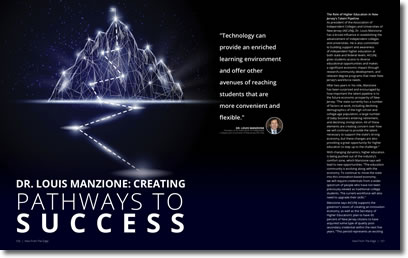The Role of Higher Education in New Jersey’s Talent Pipeline
As president of the Association of Independent Colleges and Universities of New Jersey (AICUNJ), Dr. Louis Manzione has a broad influence in establishing the advancement of independent colleges and universities. He is also committed to building support and awareness of independent higher education at both state and federal levels. AICUNJ gives students access to diverse educational opportunities and makes a significant economic impact through research,community development, and relevant degree programs that meet New Jersey’s workforce needs.
After two years in his role, Manzione has been surprised and encouraged by how important the talent pipeline is to the future economic prosperity of New Jersey. “The state currently has a number of factors at work, including declining demographics of the high school and college-age population, a large number of baby boomers entering retirement, and declining immigration. All of these elements are creating concern over how we will continue to provide the talent necessary to support the state’s strong economy, but these changes are also providing a great opportunity for higher education to step up to the challenge.”
With changing dynamics, higher education is being pushed out of the industry’s comfort zone, which Manzione says will lead to new opportunities. “The education community is evolving along with the economy. To continue to move the state into this innovation-based economy, we will require credentials from a wider spectrum of people who have not been previously viewed as traditional college students. The current workforce will also need to upgrade their skills.”
Manzione says AICUNJ supports the governor’s vision of creating an innovation economy, as well as the Secretary of Higher Education’s plan to have 65 percent of New Jersey citizens to have acquired some type of quality post-secondary credential within the next five years. “This period represents an exciting time for New Jersey,” says Manzione. “By higher education stepping into the spotlight, this exposure can help the state to continue to grow into a global economic powerhouse.”
Expanding the Talent Pipeline
Many adults in this country are in need of new job skills and additional education to maintain their current positions or adapt to the evolving needs of their respective industry. The societal and economic trends seen in students seeking higher education and postsecondary learning today are quite different from years past. Many more students are already working or have families and they need flexible schedules and courses that can be completed at their own pace, as well as having the option to receive other validated credentials outside of traditional academic degrees.
In an age of digital transformation, colleges and universities are being forced to explore the role of technology in the future success of their organizations and how they can put the planning and required resources in place that help them to keep moving forward. “Many institutions are trying to determine how they use technology to promote affordability and access,” shares Manzione. “Colleges and universities are looking at how they can use online learning and other tools to expand the talent pipeline. Schools want to be affordable and accessible to a wide spectrum of students with various economic needs. Some students are leading a family, others are currently in a job where they need to upgrade their skills, but daytime classes are not an option. Technology can provide an enriched learning environment and offer other avenues of reaching students that are more convenient and flexible.”
Student Recruitment and Retention
With the introduction of new technology, learning possibilities continue to grow and offer new opportunities for students and faculty. The evolution of technology and permeation of multimedia content and the Internet are shaping nearly every profession and how the education community prepares students to enter this working world. “Studies are showing that higher learner engagement leads to better student outcomes,” shares Manzione. “New digital tools are helping improve that engagement and we can craft these tools and content to meet the needs of a specific classroom. Technology is enabling affordability and accessibility, especially for nontraditional students, and helping create more engaged learners.”
New Jersey institutions are committed to staying on the leading edge of technology to attract more students, effectively meet their expectations, and keep them engaged through graduation. Digital tools allow students to explore their interests and access the high- quality resources they need to prepare for the future and enter the workforce as valuable intellectual assets from the outset.
Edge works with independent colleges and universities in New Jersey to provide needed services and optimize technology, spend, and investment. “All of our institutions are striving for greater affordability and accessibility for students from all economic backgrounds,” says Manzione. “Our institutions are trying to hold down tuition and provide as much financial aid as possible to allow more students the opportunity to receive an education. Exploring cost-saving and shared services are among some of the primary objectives of AICUNJ this year, so institutions can devote more of their resources to student outcomes and support, as well as improving facilities for engaged learning.”
AICUNJ works diligently to make education affordable for all students and better serve the growing number of nontraditional students and adult learners. “About 15 percent of our students do not pay tuition because of a combination of institutional aid, merit aid, and state and federal grant funding,” says Manzione. “Another 27 percent of our students pay under $10,000 of tuition to attend our colleges and universities.”
Connecting Education and Employment
In the upcoming year, AICUNJ will be very focused on supporting the governor’s Jobs NJ initiative of ensuring all career-seeking residents have the education and training necessary to access high-quality employment. Closing the gap between the needs of employers and the skills of prospective employees is essential to creating successful pathways for both individuals and businesses. The three strategic priorities of Jobs NJ include expanding access to opportunities, training individuals for in-demand jobs, and matching talent to open positions. “We need to drive better alignment between needed skills and how we educate and build the talent pipeline,” says Manzione. “This critical linkage is extremely important in today’s fast- paced economy.”
Manzione says New Jersey is very fortunate to have a strong corporate sector that is well connected to the state’s higher education institutions, with the Jobs NJ initiative further building upon those ties. “I recently met with representatives of the Secretary of Higher Education and the Economic Development Authority to determine how we better engage on Jobs NJ. We discussed how we can deliver high-quality credentials to greater numbers of our citizens, particularly to those that have historically been underrepresented. From the multinational corporation to smaller and medium-sized businesses, we welcome companies to share their needs and help develop curriculums, certificate programs and other credentials. Together, we can prepare not only the future talent pipeline, but help current employees grow their skills and training.”
AICUNJ’s member institutions are very responsive to the input of local employers and their suggestions on how to address identified needs with new educational programs. “We’re very quick to respond to the growing need for specialized skills, like what is required for data analytics and cybersecurity, for example,” shares Manzione. “New Jersey’s small geography is also an enormous advantage, with hundreds of employers in close proximity to colleges and universities. New Jersey understands the importance of experiential learning and giving students access to internships and other hands-on experience that can give them an advantage as they begin their careers. Like many states, we face a serious challenge with outmigration of college-age students, so we are working hard to promote the tremendous asset of New Jersey higher education, create pathways to connect students with their profession, and help our regional economy flourish.”




